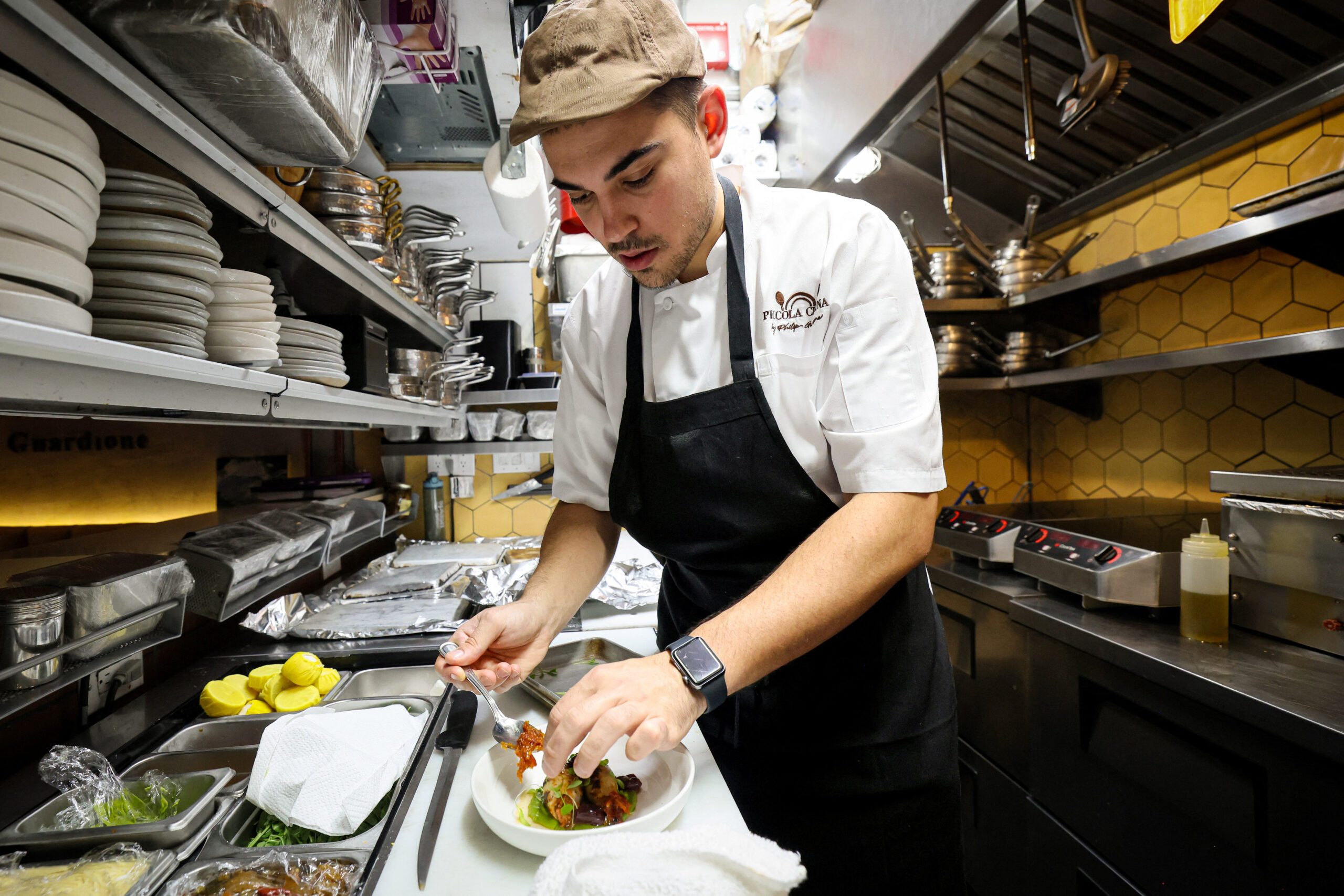SUMMARY
This is AI generated summarization, which may have errors. For context, always refer to the full article.

ROME, Italy – Like many young people growing up in Sardinia, Davide Sanna loved Italian cuisine and wanted to have a successful career as a chef. But to do so, he had to move to New York.
Sanna had worked in kitchens on the Mediterranean island and in northern Italy for four years, starting when he was only 19. But he was toiling 60 hours a week to take home just 1,800 euros ($1,963.26) a month, at best. In the busy summer season, he’d be at the stove every day for two months, without a break.
Then a fellow chef put him in contact with a restauranteur looking for cooks in New York, Sanna said. He accepted without giving it a second thought.
For the past year, the 25-year-old has cooked at Piccola Cucina, an Italian restaurant in Manhattan’s glitzy SoHo district, home to designer boutiques and high-end art galleries. In New York, he can pull down $7,000 a month, working a 50-hour week.
“Here there are regular contracts, nothing in the ‘black’,” said Sanna, using the Italian slang for undeclared labor. “And, if you work a minute extra, you’re paid for it. It’s not like that in Italy.”
Italy’s food is famous the world over but many talented young chefs, hoping to make a career in their country, find themselves frustrated by low pay, lack of labor protection, and scant prospects. Since the launch of Europe’s single currency 25 years ago, Italy has been the euro zone’s most sluggish economy.
Star chefs like Massimo Bottura, who runs the Osteria Francescana in Modena, are reinventing Italian cuisine. But, given its rich culinary tradition, Italy arguably finds itself under-represented by top-class restaurants. It has 13 with three Michelin stars – the prestigious guide book’s highest ranking – the same number as Spain. Japan, meanwhile, has 21, and France boasts 29.
The current outflow of Italian chefs due to difficult conditions at home is not a new phenomenon.
Italians began taking pizza and pasta to the world during mass emigration in the late 19th century. The popularity of Italian cuisine in Europe and the United States grew as more immigrants arrived after World War Two.
But the number of young Italian leaving to seek work in faster-growing economies has been steadily rising for decades – though the trend was briefly interrupted by the COVID-19 pandemic. Emigration, and a low birth rate, has contributed to a mounting demographic crisis: Italy’s population of 59 million is shrinking.
Much of the emigration has come from the Mediterranean islands of Sicily and Sardinia, as well as Italy’s economically underdeveloped south – the ‘mezzogiorno’.
‘Five years’ time? Not in Italy!’
Roberto Gentile, a 25-year-old chef from Sicily, has worked for the last two years cooking French food at Le Suquet, a two-star-Michelin restaurant near Toulouse, after previous jobs in Britain and Spain.
Despite his passion for Italian cuisine and the sentimental desire to go back to what Italians call the Bel Paese (the beautiful country), Gentile said the economic disincentives were too strong to consider returning.
“After gaining experience abroad and reaching a high level, you would hope to go back to Italy and find a suitable role and salary, but that doesn’t happen,” he said. “Where do I see myself in five years’ time? Not in Italy!”
Giorgia Di Marzo decided to take a chance and return to Italy in 2018, after working in Britain as a chef and restaurant manager for eight years. The 36-year-old said she wanted put down roots and be closer to her family.
But an offer of just 1,200 euros ($1,284.84) a month to work 50 hours a week in a restaurant in Milan made no sense for her. Wages in Italy have declined over the past 30 years, adjusted for inflation – the only country in Europe where that has happened.
Instead, Di Marzo opened her own eatery in her native Gaeta, a seaside town between Rome and Naples that has been a resort dating back to the Roman Empire. But soon, she ran into trouble.
Last year, rising costs forced her to close for three months during the winter low season and she could not get a loan from her bank for a sector considered at risk after the COVID pandemic.
“I stay afloat, but I can only offer seasonal contracts,” she said. “I can’t ensure work for my employees all year round.”
Eating out is part of everyday life in Italy. It has 156,000 restaurants and takeaway food outlets, the second most in Europe after France, data from international industry research group IBISWorld shows.
But the ratio of new restaurants opening to existing ones closing has been negative for each of the last six years in Italy, according to the sector’s business lobby FIPE, amid high taxes, endless red tape and the difficult economic backdrop.
‘Always in the black’
For many restaurateurs, the answer is not to declare their workers at all and a large ‘shadow economy’ is rife in the restaurant business. Undeclared work accounts for around a fifth of the Italian private sector’s output, well above a European Union average of 15%, according European Labour Authority statistics.
Such undeclared work is particularly rife in the hospitality sector, Italian economic data shows.
Italians take their food very seriously, not just as nourishment and pleasure, but an important part of their regional and national identity.
Typical dishes include tortellini in broth from the northern Emilia region, spaghetti alla carbonara from central regions around Rome, and pasta alla Norma in Sicily. Naples is the original home of pizza.
A peep into the kitchens of even the most traditional Italian restaurants shows the local dishes are often prepared by low-paid immigrants.
One such is Julio, a 31-year-old Peruvian who declined to give his surname because he has no work permit.
He prepares pizza and pasta in a Rome restaurant, working 48 hours a week for a monthly salary of 1,400-1,600 euros “always in the black.”
While similar situations are found in other developed nations, in Italy it is a relatively new phenomenon, with mass immigration only beginning around three decades ago.
‘Cooking in our blood’
Fifty-year-old Francesco Mazzei trained as a chef in his home region of Calabria in Italy’s southern toe, and then in Rome, before leaving 27 years ago for London where he arrived “without even money for cigarettes.”
He honed his art for two decades in Britain and around the world and in 2008 opened his own renowned restaurant, called L’Anima, in London’s financial district.
That launched a career which has seen him open other eateries in London and Malta and establish himself as a restaurant entrepreneur and consultant.
“I could never have done any of this in Italy,” he told Reuters.
“In England you have a chance to do business, a cook does not cost you twice as much as you pay him,” he said, referring to high Italian social charges and taxes on labor. Partly for this reason, young chefs in Italy take home half the salary of their peers in Britain while working longer hours, Mazzei said.
British people have become knowledgeable about Italian food, even learning about regional differences, he said, so he preferred to hire Italian chefs to satisfy an increasingly demanding clientele.
“We Italians have cooking in our blood. We’re the only people in the world who ask ‘what shall we eat this evening’ while they are having lunch,” Mazzei said.
Meloni’s ministry for food pride
Italian Prime Minister Giorgia Meloni’s right-wing government has set up a ministry for food sovereignty as part of a drive to boost national pride. The minister, Francesco Lollobrigida, suggested in March establishing a task force of tasters to monitor quality standards in Italian restaurants around the world, to avoid chefs getting recipes wrong or using ingredients that aren’t Italian.
But the government has also facilitated the temporary and informal work arrangements that blight the restaurant sector in Italy, and it opposes calls for a minimum wage.
Antonio Bassu, a 28-year-old Sardinian chef who works in a high-end restaurant in Barcelona, said Spanish salaries were lower than in northern Europe but working conditions were still far better than back home.
A chef in Spain can expect a regular open-ended contract based on 40 hours per week with two days off, he said, unlike in Italy where they are likely to be hired on a temporary contract, if there is a contract at all.
“Here you don’t have to beg for what you get,” Bassu said. ($1 = 0.9168 euros) – Rappler.com
Add a comment
How does this make you feel?





There are no comments yet. Add your comment to start the conversation.